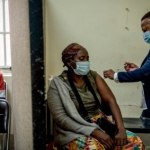Scientists are examining available data to try to understand who might win the battle of the coronavirus variants.
科学家们正在检查可用数据,试图了解谁会赢得新冠病毒变种之战。
Right now, the Delta variant is the dominant variant in the world. But after looking at data from South Africa and Britain, some scientists say the Omicron variant may soon overtake it.
目前,德尔塔变种在全球占主导地位。但是在查看了英国和南非的数据之后,一些科学家表示奥密克戎变种可能很快就会超过它。
"It's still early days, but ... Omicron is likely to outcompete Delta in many, if not all, places," said Dr. Jacob Lemieux. He researches coronavirus variants for a group led by Harvard Medical School.
雅各布·勒米厄博士表示:“现在尚为时过早,但是奥密克戎很可能会在很多地区超过德尔塔,即使不是全部地区。”他在哈佛医学院领导的一个小组中研究新冠病毒变种。
But other experts said it is too soon to know whether Omicron will spread more quickly and easily than delta.
但是其他专家表示,现在判断奥密克戎是否比德尔塔传播更快更容易尚为时过早。
Matthew Binnicker is a virus expert at the Mayo Clinic in Rochester, Minnesota. He said "we'll know in about two weeks" whether Omicron will overtake Delta. He noted that the U.S. is still seeing "significant surges" of the Delta variant.
马修·宾尼克是明尼苏达州彻斯特市梅奥诊所的病毒专家。他表示,我们将会在两周内知道奥密克戎是否会超过德尔塔。他指出,美国仍然可以看到德尔塔变种的显著激增。
Many important questions about Omicron remain unanswered. It is still unclear if the virus causes milder or more severe illness. It is also not yet known if it might escape immunity from earlier COVID-19 illnesses or vaccines.
关于奥密克戎的许多重要问题仍然未得到解答。目前尚不清楚该病毒是否会导致更轻或是更严重的疾病。目前也还不知道它是否能够逃过早期新冠肺炎或接种疫苗带来的免疫力。
On the issue of spread, scientists point to what is happening in South Africa, where Omicron was first found. Omicron has quickly spread there and has nearly become the dominant strain. Health experts worry the country is at the start of a new wave that may overcrowd hospitals.
在传播问题上,科学家们提到了最早发现奥密克戎的南非正在发生的事情。奥密克戎在南非迅速蔓延,几乎成为了主导毒株。卫生专家担心,该国正处于新一波可能导致医院人满为患的疫情的开始。
In the middle of November, South Africa averaged less than 200 COVID-19 cases per day. But last week, the country saw more than 10,000 cases per day. Experts say omicron makes up more than 90 percent of the new cases in Gauteng province, the center of the new wave. The new variant is quickly spreading and becoming dominant in South Africa's eight other provinces, as well.
11月中旬,南非平均每天只有不到200例新冠肺炎病例。但是上周,该国每天新增病例超过1万例。专家表示,豪登省作为这波新疫情的中心,奥密克戎占到了新增病例的90%以上。这种新变种在南非其它8个省份也迅速传播并占据主导地位。
Willem Hanekom is director of the Africa Health Research Institute in South Africa.
威廉·哈内科姆是南非非洲卫生研究所所长。
"The virus is spreading extraordinarily fast," Hanekom said. "If you look at the slopes of this wave that we're in at the moment, it's a much steeper slope than the first three waves that South Africa experienced."
哈内科姆表示:“这种病毒传播特别快,如果你看一下我们目前这波疫情的感染曲线斜度,它比南非经历的前三波疫情要陡峭得多。”
Scientists say it is unclear whether Omicron will act the same way in other countries as it has in South Africa. But in Britain, Lemieux said, "we're seeing what appears to be a signal of exponential increase of Omicron over Delta."
科学家们表示,目前尚不清楚奥密克戎在其它国家是否会跟南非一样发展。但是在英国方面,勒米厄表示:“我们似乎看到了奥密克戎对德尔塔呈指数增长的信号。”
In the United States, "there's still a lot of uncertainty," he said. But "based on what we've observed in South Africa, it's likely to become the dominant strain in the coming weeks and months and will likely cause a surge in case numbers."
他说,在美国方面“仍然存在很多不确定性。但是“基于我们在南非观察到的情况,它很可能在未来几周或几个月内成为主要毒株,并可能导致病例数激增。”
It is not yet known what such a surge would mean for public health.
目前尚不清楚这种激增对公共卫生来说意味着什么。
Hanekom said early data from South Africa show that reinfection rates are much higher with Omicron than earlier variants. That would suggest the virus is escaping some immunity. It also shows the virus seems to be infecting younger people, mostly those who are unvaccinated. Early information also shows most cases in hospitals have been mild.
哈内科姆表示,南非的早期数据表明,与早期变种相比,奥密克戎的再感染率要高很多。这表明该病毒正在逃避某些免疫力。它还表明该病毒似乎正在感染年轻人,主要是未接种疫苗的那些人。早期信息还显示,大多数医院病例是轻症。
But experts say the situation could be different in other parts of the world or in different groups of patients.
但是专家表示,世界其它地区或不同患者群体的情况可能会有所不同。
"It'll be really interesting to see what happens when more infections potentially occur in older adults or those with underlying health conditions," Binnicker said.
宾尼克表示:“当更多感染可能发生在老年人或存在潜在健康问题的人士当中时,看看会发生什么,这会让人好奇。”
As the world waits for answers, scientists suggest people do all they can to protect themselves.
当全球都在等待着答案,科学家们建议人们尽其所能保护好自己。
If "people are not vaccinated they should get vaccinated," Lemieux said. "If people are eligible for boosters, they should get boosters, and then do all the other things that we know are effective for reducing transmission."
勒米厄表示,“如果人们没有接种疫苗,他们应该接种疫苗。如果人们有资格打加强针,他们应该打加强针。然后践行那些我们已知对减少传播有效的所有其它事情。”
I'm Dan Novak.
我是丹·诺瓦克。(51VOA.COM原创翻译,请勿转载,违者必究!)














